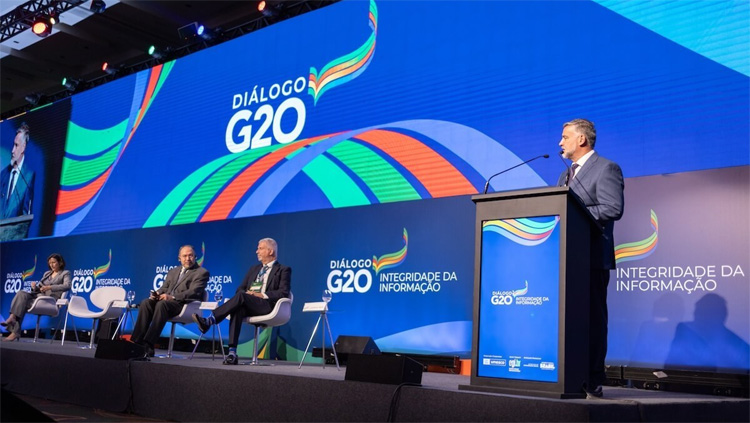Brasil announces the launch of a global initiative to promote information integrity regarding climate change
The promotion and defense of information integrity are at the center of global debates, with Brasil taking a leadership role.
Minister Paulo Pimenta of the Social Communication Secretariat of the Presidency of the Republic (Secom/PR) stated that the country is leading a global initiative to promote information integrity regarding climate change, and sees the G20 as a privileged platform for this purpose. The announcement was made on Wednesday, May 1st, 2024, during the opening of a G20 Digital Economy Working Group side event in São Paulo.
Pimenta indicated that the United Nations (UN) and the United Nations Educational, Scientific and Cultural Organization (UNESCO) are collaborating in the development of the proposal, which aims to facilitate the integration of international research collectives such as the Global Knowledge Network, the International Observatory on Information and Democracy, and the International Panel on the Information Environment (IPIE), as well as other UN agencies directly involved in addressing climate change.
“We believe that misinformation and hate speech impede the full exercise of individual and collective rights. Countering misinformation and hate speech strengthens freedom of expression by promoting access to information for society as a whole and protecting the expression rights of minority groups,” asserted the Brazilian minister.
During his address, Pimenta also underscored the Brazilian government’s commitment to ongoing dialogue to address misinformation and hate speech, while advocating for human rights. To illustrate these efforts, the minister highlighted initiatives such as Brasil Contra Fake (in English, Brasil Against Fake News), ComunicaBR, and the Brazilian Media Education Strategy. “Brasil is dedicated to a comprehensive approach that promotes a balance of rights. We believe in the value of information and transparency to ensure that citizens have accurate information about the government and public policies,” the minister emphasized.
Platform regulation
Pimenta further underscored that Brasil will persist in advocating for the “democratic” regulation of digital platforms globally. The government’s head of communications reiterated that the business model of these companies favors the spread of misinformation and hate speech and that platforms need to “take more responsibility to ensure that the digital environment is not used for the dissemination of illegal content.”
“The regulation should be balanced to promote and ensure freedom of expression while protecting other fundamental rights of citizens. We understand that the European Union and the United Kingdom are benchmarks of recent legislation that align with this direction and should inspire global discussions,” stated the minister.
Global community roles
Tawfik Jelassi, Deputy Director-General of Communication and Information at UNESCO, underscored the significance of the present moment for discussing information integrity. He observed that several countries will have elections in 2024 and the impacts of misinformation on the political landscape have already been measured and identified, demanding immediate action. He reiterated support for the Brazilian presidency’s movement within the G20 and expressed high expectations regarding the outcomes of the country’s leadership in international events in the coming years, “which will have a significant impact and greatly contribute to ensuring an open and accessible Internet for all.”
Melissa Fleming, Under-Secretary-General for Global Communications at the United Nations, echoed Jelassi’s concerns about elections and added ongoing conflicts and the deepening climate crisis to the mix. She did so in a context where the worship of generative Artificial Intelligence has “shaped information with consequences never before imagined. The present moment is one of considerable anxiety and fear.”
Fleming emphasized that the global community is gathered around the theme of information integrity with hope that solutions will emerge from multilateralism. She advocated for global efforts to combat hate speech for a healthy Internet. “Our objective is to create an information ecosystem and landscape that is not polluted but rather healthy and flourishing,” said Fleming.


Comments are closed.